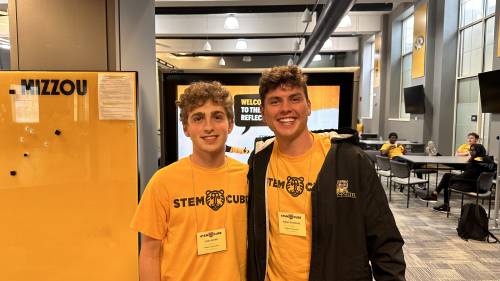
When Aidan Dowdney was looking for colleges, he was thinking about more than a bachelor’s degree.
“It’s good to look four years down the road, but what about 10 years down the road?” Dowdney said. “That works a lot better if your medical school and your undergrad work together. Mizzou was close to home and their medical school was excellent.”
Dowdney, originally from Lake of the Ozarks, was born with congenital hip dysplasia and needed a corrective surgery at a very young age. Instead of being able to receive care in his rural hometown, he had to get the corrective surgery at Shriners Hospital for Children in St. Louis
“When I was young the rural medicine angle was not the one I wanted to take,” said Dowdney. “Later, it became ‘I had this negative experience, how can I change that into something positive?’”
This desire to make big changes to the medical field led Dowdney to the biochemistry program at Mizzou, and his randomly assigned roommate on the third floor of Discovery Hall: Luke Smith.
Smith, a native of Union, Missouri, has always had a passion for rural healthcare.
“My grandparents live in a town of 150 people and they have to drive 40 minutes to the nearest hospital,” said Smith. “That’s been my motivator. I always knew I wanted to go to Mizzou for undergrad, but didn’t know for sure where I wanted to go to medical school until I heard about the Bryant Scholars Program. I’ve always wanted to go into a rural area, so it is great that they incentivize people to do that.”
While Smith started his time at Mizzou as a biology major, he became fast friends with roommate Dowdney, who convinced him to switch to biochemistry, both for the content knowledge, low faculty to student ratio and the close-knit CAFNR experience. Both went on to serve as CAFNR Ambassadors.
“As CAFNR Ambassadors we talked about that all the time: you’re able to form such meaningful relationships with your professors,” said Smith. “The biggest biochemistry class you’ll ever take is 100 students. It feels very homey. You have your own community inside of Mizzou.”
Since then, Dowdney and Smith have participated in many CAFNR activities together to work toward their desired careers in different medical specialties: orthopedics and pediatrics, respectively, including working in a cancer research lab on campus and participating in community service.
“We have done a lot of the same things, but our involvement is actually very different on paper as we evolved within those organizations,” said Smith. “We’ve really kind of grown together, and that made us better applicants for the Bryant Scholars program.”
The Bryant Scholars Program is a University of Missouri School of Medicine pre-admittance program for undergraduate students interested in rural medicine. Acceptance into the Bryant Scholars Program is based on high academic achievement, commitment to a career in rural medicine, possession of personal characteristics expected of quality physicians, and a small town or rural background. Bryant Scholars must be a Missouri resident, show evidence of leadership and interest in a variety of extracurricular activities, meet specific GPA and course standards, and be enrolled at a four-year college or university in Missouri or a contiguous state. Students accepted into the pre-admission program are offered acceptance into the MU School of Medicine on the condition that they achieve certain academic standards, demonstrate ongoing professionalism, and participate in required activities during their last two years of undergrad. Students who matriculate to the University of Missouri School of Medicine through the Bryant Scholars Pre-Admissions Program also have rural curricular requirements while attending medical school. Each year, over 50 students apply and up to 20 students are accepted as Bryant Scholars.
Smith and Dowdney completed their applications together, were both accepted to the program, and are excited to bring their future medical school education to rural communities.
“Rural people understand rural problems,” Dowdney said.
“For me it’s the sense of community you get being in a rural area,” said Smith. “I like the idea of being in a community like I grew up in, that really has to work with each other to better themselves. That’s very powerful. Being able to teach kids in those communities things like preventative health care would be very cool to me. The feeling of everyone working together to boost each other up is what has drawn me toward rural medicine.”